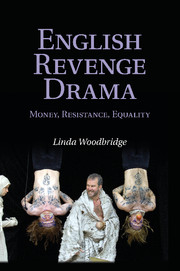Book contents
- Frontmatter
- Contents
- List of figures
- Acknowledgments
- English revenge plays discussed in this book
- Standard MLA abbreviations for Shakespeare's plays
- Note on the text
- PART I RAMPANT REVENGE
- PART II ECONOMIC UNFAIRNESS: REVENGE AND MONEY
- PART III POLITICAL UNFAIRNESS: REVENGE AND RESISTANCE
- 6 “A special inward commandment”: the mid sixteenth century
- 7 Resistance in the golden age of revenge plays
- 8 Revenge and regicide: the Civil War era
- PART IV SOCIAL UNFAIRNESS: VENGEANCE AND EQUALITY
- Conclusion
- Bibliography
- Index
6 - “A special inward commandment”: the mid sixteenth century
Published online by Cambridge University Press: 06 December 2010
- Frontmatter
- Contents
- List of figures
- Acknowledgments
- English revenge plays discussed in this book
- Standard MLA abbreviations for Shakespeare's plays
- Note on the text
- PART I RAMPANT REVENGE
- PART II ECONOMIC UNFAIRNESS: REVENGE AND MONEY
- PART III POLITICAL UNFAIRNESS: REVENGE AND RESISTANCE
- 6 “A special inward commandment”: the mid sixteenth century
- 7 Resistance in the golden age of revenge plays
- 8 Revenge and regicide: the Civil War era
- PART IV SOCIAL UNFAIRNESS: VENGEANCE AND EQUALITY
- Conclusion
- Bibliography
- Index
Summary
She had lost her belief in divine retribution. Vengeance was for this world.
Salman Rushdie, The Moor's Last SighThe preoccupation with Fortuna's mutability dovetailed with the era's passionate responses to tyranny, with which strong Renaissance rulers, like the Tudors with their centralized authority and enforced religious conformity, were routinely charged. The sudden falls of Henry VIII's most trusted advisors (More, Cromwell, Wolsey) uncannily resembled the capricious whirl of Fortuna's wheel. As Raleigh recalled, “How many servants did he advance in haste (but for what virtue no man could suspect) and with the change of his fancy ruined again; no man knowing for what offense? … How many wives did he … cast off, as his fancy and affection changed?” (133–4). Sir Thomas More wrote seven poems on Fortune (Complete Works i: 31–43, 45–46). Imprisoned in the Tower, he lamented, “Long was I, Lady Luck, your serving-man, / And now have lost again all that I gat” (i: 46). Henry VIII was often accused of tyranny “not merely by his rivals and enemies abroad but by his own subjects, and despite novel and savage legislation that made it a specific capital offence for anyone to do so” (Greg Walker 1). Tyranny was a concern across Europe. Italian city-states modulated from republics into virtual monarchies: a prominent family would gain control of the state and abolish democracy (Piccolomini 65). In the absence of peaceable means of redress, resistance theorists advocated violent overthrow of rulers, and European resistance movements burgeoned.
- Type
- Chapter
- Information
- English Revenge DramaMoney, Resistance, Equality, pp. 129 - 166Publisher: Cambridge University PressPrint publication year: 2010



